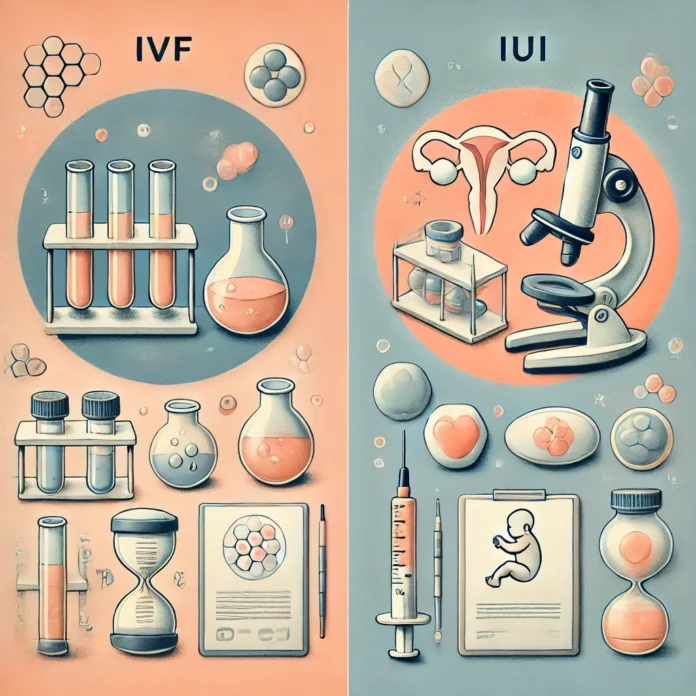When it comes to fertility treatments, two acronyms often dominate the conversation: IVF (In Vitro Fertilization) and IUI (Intrauterine Insemination). Both can help individuals and couples overcome challenges in their journey to parenthood, but they’re vastly different in terms of process, cost, and success rates. So how do you choose between them? Let’s break it all down to help you understand these treatments and decide which one might be right for you.
The Basics: What Are IVF and IUI?
What is IUI?
IUI, or Intrauterine Insemination, is a less invasive fertility treatment. It involves placing washed and concentrated sperm directly into the uterus during ovulation to increase the chances of fertilization.
- Best for: Mild male infertility, unexplained infertility, or cervical issues.
- Procedure: Sperm is collected, “washed” to improve its quality, and inserted into the uterus using a catheter.
- Cost: $300–$1,000 per cycle (varies by location and clinic).
What is IVF?
IVF, or In Vitro Fertilization, is a more advanced procedure where eggs are retrieved from the ovaries and fertilized with sperm in a lab. The resulting embryo(s) are then transferred into the uterus.
- Best for: Blocked fallopian tubes, severe male infertility, endometriosis, or when other treatments have failed.
- Procedure: Involves hormonal stimulation, egg retrieval, lab fertilization, and embryo transfer.
- Cost: $12,000–$25,000 per cycle (can vary widely).
The Process: How Do They Work?
IUI Process:
- Ovulation Monitoring:
- You may take ovulation-inducing medications to ensure the timing is optimal.
- Sperm Collection and Preparation:
- Sperm is collected and processed to isolate the healthiest and most mobile ones.
- Insemination:
- A doctor uses a thin catheter to place the sperm directly into your uterus.
- Wait:
- After insemination, it’s up to biology. A pregnancy test follows in about two weeks.
IVF Process:
- Ovarian Stimulation:
- You’ll take hormonal injections to produce multiple eggs for retrieval.
- Egg Retrieval:
- A minor surgical procedure collects eggs from the ovaries.
- Fertilization:
- Eggs are fertilized with sperm in a lab, creating embryos.
- Embryo Transfer:
- One or more embryos are placed into the uterus.
- Wait:
- Like IUI, you’ll take a pregnancy test about two weeks later.
Key Differences Between IVF and IUI
| Aspect | IUI (Intrauterine Insemination) | IVF (In Vitro Fertilization) |
|---|---|---|
| Invasiveness | Minimally invasive | Highly invasive, includes surgery |
| Cost | Affordable (~$300–$1,000 per cycle) | Expensive (~$12,000–$25,000 per cycle) |
| Success Rates | ~10–20% per cycle | ~40–60% per cycle (varies by age) |
| Complexity | Simple procedure, few appointments | Multi-step process, intensive monitoring |
| Best For | Unexplained or mild infertility | Complex infertility issues |
| Medications Needed | Minimal (optional) | Heavy hormonal stimulation |
Pros and Cons of Each
IUI: The Simpler Option
Pros:
- Less Expensive: A more accessible option for many individuals and couples.
- Non-Invasive: Requires no surgery or egg retrieval.
- Low Commitment: Fewer appointments and less stress compared to IVF.
Cons:
- Lower Success Rates: Particularly for older women or severe infertility cases.
- Limited Applicability: Not effective for conditions like blocked fallopian tubes or severe male infertility.
IVF: The Advanced Solution
Pros:
- Higher Success Rates: Especially for those with severe infertility or older age.
- Control Over Fertilization: Doctors can select the best embryos for transfer.
- Genetic Testing Available: Embryos can be tested for genetic conditions before transfer.
Cons:
- Costly: The high price can be prohibitive without insurance coverage or financial aid.
- Time-Intensive: Requires multiple appointments, injections, and careful monitoring.
- Emotionally Demanding: The process can be physically and emotionally challenging.
Who Should Choose IUI?
IUI might be the right choice if:
- You’re under 35 and have mild infertility or unexplained infertility.
- Your partner has low sperm motility or count, but not severely so.
- You’re looking for a less invasive, more affordable starting point.
Who Should Choose IVF?
IVF is often better if:
- You’ve tried IUI or other treatments without success.
- You have conditions like blocked fallopian tubes, endometriosis, or severe male infertility.
- You want to maximize your chances of conception with one treatment cycle.
What About Florida-Specific Considerations?
For Florida residents, consider:
- Insurance Coverage:
- Florida does not mandate fertility treatment coverage, so check your insurance policy for specifics.
- Clinic Options:
- Florida is home to several reputable fertility clinics, offering both IUI and IVF.
- Weather Factor:
- The process involves multiple appointments. If you’re in hurricane season, plan accordingly to avoid disruptions.
Final Thoughts: Which Should You Choose?
- Start with IUI if: You’re younger, have unexplained infertility, and prefer a less invasive, lower-cost option.
- Consider IVF if: You’ve tried other methods, have a complex fertility diagnosis, or want the highest success rates.
Both IUI and IVF have helped countless families grow, but the choice depends on your unique situation, budget, and goals. Consulting with a fertility specialist is the best way to determine the right path for you. Whether you go the simpler route or embrace the more advanced option, remember: every step is a move closer to your dream of parenthood.
Disclaimer: This article is for informational purposes only and should not be considered medical advice. The content is based on general information about IVF and IUI and may not reflect your specific circumstances. Always consult a qualified fertility specialist or healthcare provider to discuss your unique situation, potential treatment options, and medical needs. The costs, success rates, and procedures mentioned in this article are approximate and can vary by location, clinic, and individual factors. The author and publisher are not responsible for any decisions made based on the information provided in this article.






